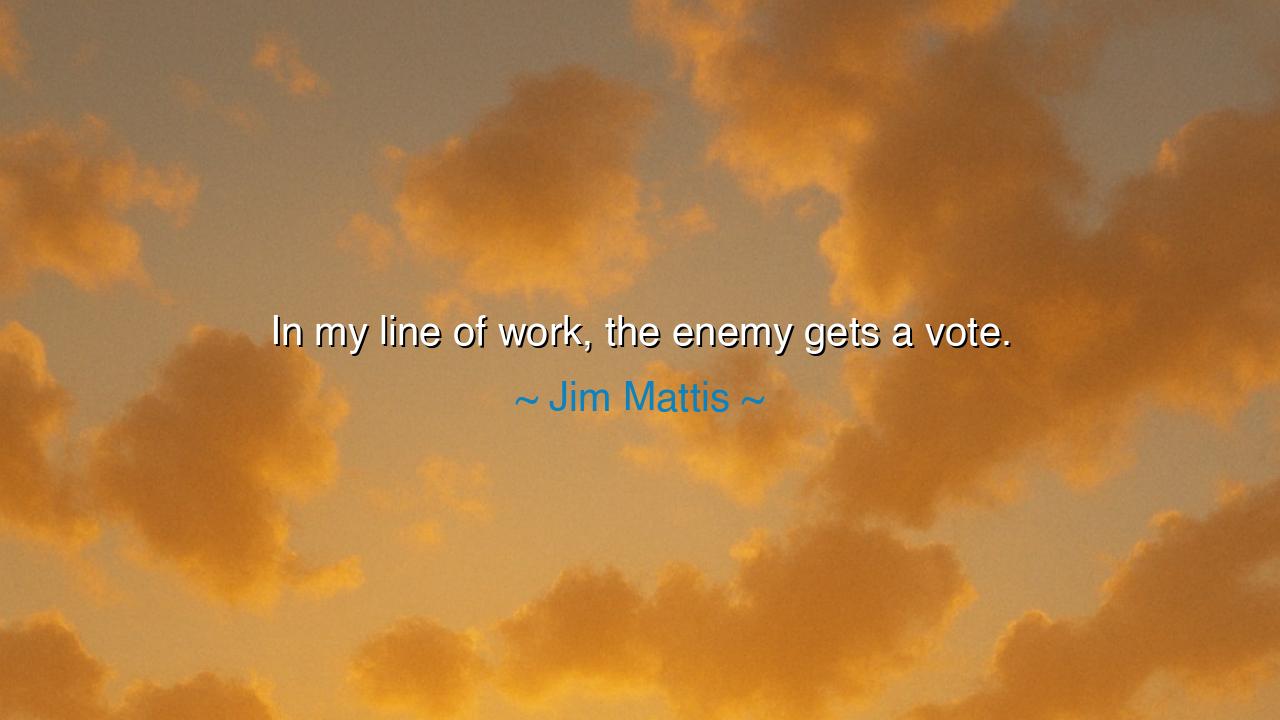
In my line of work, the enemy gets a vote.






The words of Jim Mattis—“In my line of work, the enemy gets a vote”—strike with the steel of battlefield wisdom. They remind us that no plan, however carefully forged, stands alone. For in war, as in life, the will of the other—the adversary, the obstacle, the storm—always shapes the outcome. To forget this truth is folly; to embrace it is the way of the seasoned warrior.
The ancients knew this lesson well. Generals of old spoke of work not as solitary design but as a contest of wills. The Spartan understood that the enemy was not a silent stone to be moved at leisure, but a living force, cunning and relentless, who must be accounted for at every turn. Thus, Mattis teaches that even the strongest strategy must bow to the reality that others have power, others have choice, and their vote will be cast on the field of struggle.
This truth is humbling, for it strikes at the pride of human certainty. Many wish to believe they alone command destiny. Yet the warrior, the leader, the wise, know otherwise: no man, no nation, moves unopposed. The enemy does not grant permission, but takes action; and it is in answering, adapting, and enduring that true strength is proven.
Yet there is also power in this acknowledgment. To recognize that the enemy has a vote is not defeat—it is preparedness. It is the discipline to build plans flexible as water, strong as iron, ready to shift when tested. The ancients called this the virtue of prudence: not arrogance in one’s own design, but readiness for the blows that will surely come.
So let this teaching be remembered: in every contest, in every struggle, you do not act alone. The enemy has a hand in the tale, the world itself casts its ballot, and fate weighs in with its unseen hand. Do not despair of this, but embrace it—for the greatest victories are not those uncontested, but those won in full knowledge of resistance, when strength, wisdom, and courage rise to meet the challenge.






TGGojo Thay Giao
Jim Mattis’s quote really speaks to the concept of adaptability and awareness in the face of competition. It’s easy to assume we’re in full control, but sometimes the environment, or the actions of others, can drastically change the outcome. How do we adjust our strategies when we face opposition? Do we accept it as part of the process, or do we resist it? How can we turn the situation to our advantage?
HYHong Yen
This quote from Jim Mattis is both humbling and realistic. It underscores the importance of acknowledging the role of others in any given situation. Whether in negotiations, sports, or even personal relationships, it's important to remember that our plans aren’t the only ones in play. How do we manage our expectations and stay resilient when things don’t go our way? Can we turn opposition into an opportunity to learn and grow?
DBNguyen Duy Bao
Jim Mattis's insight is a powerful reminder that we can never assume complete control over situations, especially when dealing with opponents or adversaries. In business or personal life, there will always be variables outside of our control. How can we better prepare ourselves mentally to adapt and respond effectively to the unexpected? What strategies can we adopt to keep moving forward, even when things don’t go as planned?
NTThanh Thuy Nguyen Thi
The quote from Jim Mattis speaks to the reality of dealing with resistance and opposition, especially in complex or competitive environments. It makes me reflect on how often we underestimate the impact of others' actions on our own decisions. How do we stay prepared for surprises or setbacks when others have the ability to influence our plans? How do we maintain control when the other side is actively participating in the situation?
DMLe Dinh Minh
Jim Mattis’s quote really highlights the unpredictability of life, especially in high-stakes situations. In any form of conflict, the actions of the other side always matter. It makes me think about how in everyday life, even when we make plans or set goals, there are always factors outside our control that can alter the outcome. How do we manage these uncertainties and adjust when unexpected challenges arise?